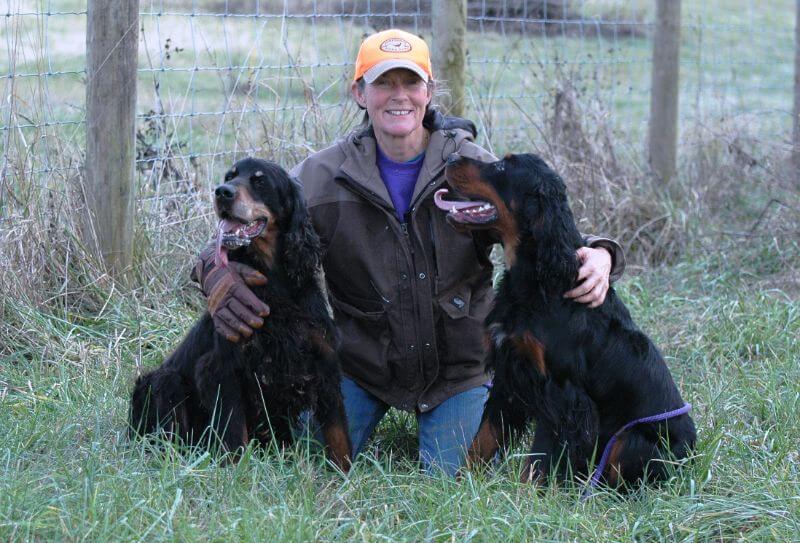Interview With Rhonda Cornum, Breeder behind the Munroc Farm Kennel
Where do I live? How many years in dogs? How many years as a breeder?
Rhonda Cornum: I live in Paris, Kentucky, on a 700-acre farm complete with cattle, horses, woods, wildlife, and hay fields. I have been in purebred dogs since junior high school; about 55 years. First love has always been Gordon Setters, though we have expanded to include a few Miniature Pinschers, one English Setter, and a few Irish Red and White Setters.
What is my kennel name? How many dogs do I currently keep?
Rhonda Cornum: The Farm name is “Munroc Farm,” so it is Munroc Farm Kennel. There are three Miniature Pinschers, seven Gordons, and one Irish Red and White Setter that live here with me full time. I am, however, the non-custodial co-owner of a number of other dogs. This is how we manage for each dog to get a family and a lot of individual attention while keeping enough dogs to maturity to make sure we compete with, and breed, the best.
Which show dogs from the past have been my noteworthy winners?
Rhonda Cornum: The most noteworthy winner from the past was “Hunter,” BISS, Am. Ch., Int. Ch. (FCI), Dt. Ch., Dt. Sch. Ch., Ch. PL Gordon’s Dream Admire, VGP (1) HZP, FT, Btr. All those initials indicate Hunter won a Best in Specialty show in Germany, earned an American, German, and Polish championship, and that he won essentially every field award available in Germany.
In addition, Hunter was reserve (of 87 male Gordons) at the World Show in Poznan, Poland, and placed at Crufts several times. Hunter is in the pedigree of every dog we have or have had, with the exception of one Italian and one Australian import.
Which have been my most influential sires and dams?
Rhonda Cornum: Our most influential male is undeniably “Seymour,” GCH Munroc the Black Watch MH. Now completely retired, he looks back at a very successful career, but his greatest contribution is as a sire. He was the GSCA Number One Sire for 2022. He has produced 10 champions to date, including one DC, and there are at least eight more who are pointed both in the ring and the field. Though I never bred to him, he was bred to a very wide spectrum of bitches, with varied looks and pedigrees.
In each case, he stamped puppies with his beautiful head, gentlemanly disposition, and a lot of talent in the field. I have currently leased one of his daughters for a breeding, and am very excited about the prospects.
Our most influential dam is “Amber,” Am. & Austrian Ch. Munroc Forest Amber VGP. She is a daughter of Hunter from the first litter back in 2004. Although originally sold to a woman in Austria, I was able to buy her back when she was four. She had two litters of puppies and every dog we have is, in some way, descended from one of those two litters.
Can I talk a bit about my facilities? Where are my puppies whelped? How are they raised?
Rhonda Cornum: The farm is a great place to be a young dog and learn about terrain, swimming, and hunting. It was never intended to be a kennel, and there can be dogs everywhere; in the house, on the porch, in a log cabin in the yard, and in a kennel built into an existing barn.
The “house dogs” are the oldest and generally retired from competition, though my 10.5-year-old, “Libby,” still insists on running in a Gun Dog stake at every field trial. Young dogs stay in the log cabin, a few steps from the main house, making them conveniently available for short training sessions throughout the day. Visiting dogs, and adults getting ready for shows or trials, are generally at the kennel.
Puppies are usually whelped and stay through weaning at a friend’s house. If they are whelped here, there is a special puppy room and adjoining covered yard at one of the horse barns. The mom and I move in a few days before they are due. Unfortunately, there is a particularly virulent strain of parvovirus in the ground somewhere near my house, and so it is not safe to have them in the house nor to let them or the mom out in the yard until all are fully immunized.
What is my “process” for selecting Show Puppies? Performance Puppies? Field Puppies?
Rhonda Cornum: It is the same process for selecting what I believe to be the best puppy, for the ring or the field. I have no confidence that a “point” I might see at seven or eight weeks means that I will (or won’t) see the same thing at 7 months or 2 years.
In my experience, they all point! Therefore, my emphasis in picking puppies is movement and conformation. Of course, I look especially hard at the things (width of shoulders, amount of sternum, depth of muzzle, etc.) that might have been less than perfect in either parent.
We do not “select” puppies for the companion events; every Gordon Setter is able to do Obedience, Rally, and Agility if their owner puts in time and effort.
Do I compete in Companion Events? Performance Events?
Rhonda Cornum: I personally rarely do any Companion Events. There is one co-owner of four dogs who is dedicated to Agility. We have the Number One Irish Red and White Setter in Agility, and all the Gordons we co-own have gotten advanced Agility titles. I think it is a great way for owners and dogs to spend time together doing something fun and in which accomplishment can be measured.
Are Field Trials or parent club Hunt Tests important to me?
Rhonda Cornum: I am an enthusiastic participant in both Hunt Tests and Field Trials. In the past year, we have finished two Dual Champion Gordons, and have put a Master Hunter on both of those dogs, as well as several other Gordons and my Irish Red and White Setter. I believe demonstrating that my dogs look AND perform as the Standard describes is very important. Actually, I believe this is the responsibility of any good breeder, particularly in a Sporting breed.
How would I define “conditioning” as it relates to my breed?
Rhonda Cornum: Because Gordons are (or should be), large, heavy-boned dogs, getting a dog in shape in the summer to be ready to field trial in October and November is a challenge. It’s too hot to run a black dog during the day in August and September in Kentucky. So, we spend a lot of time running with the ATV before the sun comes up.
Later, when we want to run the dogs off leash, I have about 300 acres of woods and there are ponds and creeks all over the farm; the dog stays in the shade and can drink and swim every 5 or 10 minutes.
Getting a dog in shape for the ring is easier. The two miles of gravel road on the farm means they can stay clean and trot at the speed I select with the ATV.
Are there any health-related concerns in my breed? Any special nutritional needs?
Rhonda Cornum: There are four diseases in Gordon Setters for which there are DNA tests, so it is easy to avoid these four. There are two diseases for which there are no DNA tests; Dungee and Juvenile Renal Disease.
The renal disease is particularly problematic as:
- It does not appear until after the puppy enters the rapid growth stage, like 4-6 months.
- Some people are less than forthcoming about it in their pedigrees. It was one of the reasons I went to Europe to breed my first litter in 2004.
Do I think my breed is supported by a sufficient number of preservation breeders?
Rhonda Cornum: If you look around the world, there are plenty of quality Gordon Setter breeders available to ensure adequate choice for many generations to come. My co-breeder lives in Germany and shows and competes all over Europe, so we see an amazing number of quality dogs. You do have to be willing to travel.
On the downside, whether it’s breeders, dog shows, or field trials, there is no doubt that the average age of the humans is getting older. I have been diligently working to get young people interested in those three events; showing, breeding, and field trialing dogs. We have met with some success and I am happy to report that we have at least two puppy buyers under 35 and they are being quite successful. Whether they will turn into breeders remains to be seen.
Is my breed well suited to be a family dog? Who are the best candidates to own my breed?
Rhonda Cornum: Gordons are perfect family dogs. They are, in fact, noted to be less accepting of being on a “trainer’s string” since they really want to have a relationship with their family. They are the perfect gentleman’s gun dog; they make quiet pets when they’re home and they’re very enthusiastic about finding and pointing and retrieving game when you take them afield. Anyone who wants to start with a puppy should be an outdoorsy type person.
What is the biggest misconception about my breed? What is my breed’s best-kept secret?
Rhonda Cornum: The biggest misconception is that you must choose either a “field type” dog or a “show type” dog. The truth is many Gordon Setters can do both very adequately. Yes, it is more difficult to successfully breed dogs and simultaneously select them for both conformation and talent.
Unfortunately, we have, in the past and present, had breeders who were unwilling or unable to select for the two important attributes of the breed, and therefore, tried to convince other people it is not possible. I, of course, assume everyone is always selecting for health, longevity, and temperament.
If I could share a comment or two with judges of my breed, what would I like to say to them?
Rhonda Cornum: I would like judges to remember two things:
While Gordon Setters should be the most substantial of the setters, they are not supposed to be the tallest. I believe that all things being equal, they should look for the average of the Standard (“Shoulder height for males, 24 to 27 inches”) not the tallest dog in the ring.
The first paragraph in the Standard says, “…appearing capable of doing a full day’s work in the field.” No dog commonly seen in the BOB ring today could go anywhere but Astroturf with the amount of coat that is being rewarded.
Do I have any words of wisdom to pass along to newer breeders?
Rhonda Cornum: To new breeders, I have to say, congratulations, you’ve picked a wonderful breed. What I learned about dog breeding is the same thing I learned about a campaign in the army. You have to have a strategic view, an operational campaign, and a tactical plan.
My strategic view is to “produce the best dual potential dogs possible.” This has to be broken up into steps. You will not get there in one generation.
So then, the operational thing is: “Every dog in my breeding program will have a championship and some field title.”
And then the tactical thing is: “What am I going to do today and this week?” For example, this month, these three are going to a show; or this season, these four will be field trialing.
What I learned about dog breeding is the same thing I learned about a campaign in the army. You have to have a strategic view, an operational campaign, and a tactical plan.
For a bit of fun, what’s the most amusing thing I’ve ever experienced with a Sporting Dog?
Rhonda Cornum: My first time with my first Gordon, in an outdoor Obedience ring, we had done well until the long sit. She saw a duck fly over the ring, and just took off and sailed over the fence after it. It was bedlam as several other dogs joined in the chase.
Are you looking for a Gordon Setter puppy?
The best way to ensure a long and happy relationship with a purebred dog is to purchase one from a responsible breeder. Not sure where to begin finding a breeder?
Contact the National Parent Club’s Breeder Referral person, which you can find on the AKC Breeder Referral Contacts page.
Want to help rescue and re-home a Gordon Setter dog?
Did you know nearly every recognized AKC purebred has a dedicated rescue group? Find your new best friend on the AKC Rescue Network Listing.
Gordon Setter Dog Breed Magazine
Showsight Magazine is the only publication to offer dedicated Digital Breed Magazines for ALL recognized AKC Breeds.
Read and learn more about the bold Gordon Setter dog breed with articles and information in our Gordon Setter Dog Breed Magazine.
Error embedding FlippingBook shortcode, please check the flipbook url. (https://digital.showsightmagazine.com/view/347907/)
If you enjoy the Gordon Setter Breed Magazine, help us educate the community by sharing it.








